

Expectations for Students with Cognitive Disabilities - NCEO Synthesis Report 55. Expectations for Students with Cognitive Disabilities: Is the Cup Half Empty or Half Full?
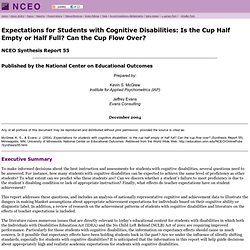
Can the Cup Flow Over? Kevin S. McGrewInstitute for Applied Psychometrics (IAP) Any or all portions of this document may be reproduced and distributed without prior permission, provided the source is cited as: Table 1. The data presented in Figure 1 are based on unpublished analyses of the WJ III standardization by the first author of the current paper (McGrew, et al., 2004). Figure 2, which is a rotated and “windowed” view of a select portion of the same data as are in Figure 1 (i.e., subjects with IQs from 70-80), clearly shows that even IQ tests that demonstrate some of the strongest correlations with achievement (r = .75) cannot be used to provide perfect estimates of predicted achievement for individual students.
The data presented in Figure 2 are based on unpublished analyses of the WJ III standardization by the first author of the current paper (McGrew, et al., 2004). Wayne RESA Special Education Centers Teacher Tools. This web area is for the use of special education teachers and staff who instruct students with cognitive impairments.
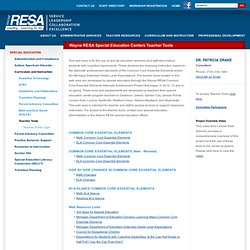
These students are receiving instruction based on the alternate achievement standards of the Common Core Essential Elements and/or the Michigan Extended Grade Level Expectations. The teacher tools located in this web area are developed by special educators through the Wayne RESA Common Core Essential Elements Alternate Achievement Project that began in 2012 -13 and is on-going. These tools and assessments are developed by teachers from special education center program teachers in Dearborn, Detroit, Garden City, Grosse Pointe, Lincoln Park, Livonia, Northville, Redford Union, Wayne-Westland, and Wyandotte.
This web area is intended for teacher and staff to access as tools to support classroom instruction. For access to the teacher tools, contact your special education administrator or the Wayne RESA special education offices. Web Resource Links. Assmt-ccee-brochure. Ccee-ela-basecheck-grade7. Test-blueprint-14. Extended Standards for Special Education. The alternate academic achievement standards provide a framework for teachers of students with the most significant cognitive disabilities to teach skills and competencies essential for independent living, employment, and postsecondary education.
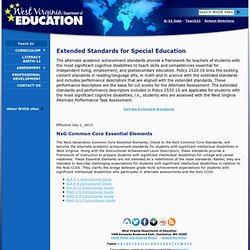
Policy 2520.16 links the existing content standards in reading/language arts, in math and in science with the extended standards and includes performance descriptors that are aligned with the extended standards. These performance descriptors are the basis for cut scores for the Alternate Assessment. Teach 21 - Professional Development. Effective professional development is considered the center of educational reform (Dilworth & Imig, 1995).

It is critical for teacher growth and student achievement. When teachers are given the opportunity, via high-quality professional development, to learn new strategies for teaching to rigorous standards, they report changing their teaching in the classroom (Alexander, Heaviside, & Farris, 1998). To be effective, professional development should be based on curricular and instructional strategies that have a high probability of affecting student learning—and, just as important, students’ ability to learn (Joyce and Showers, 2002). Model Classroom Videos Elementary Mathematics Videos Achieve 21 Presentations Back to Teach 21 Homepage. Math9-12_instructionalguide. Common Core Tools for Teachers. ELA%20Grades%206-8%20full%20doc. Alternate_Perf_Indicators_2011. Meeting the Academic Needs of Students with Cognitive Disabilities. Dynamic Learning Maps Assessment. A learning map is a network of sequenced learning targets.
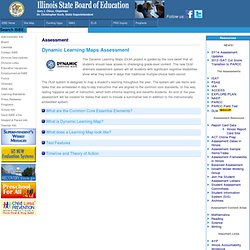
Often, we think of learning as one skill building on another single skill. A dynamic learning map, by comparison, shows a learning landscape in which multiple skills are related to many other skills. Dynamic learning maps™ not only show the relationships between skills but also show multiple learning pathways. Instead of assuming that all children learn a skill in the same way, allowing for multiple pathways recognizes that there are alternate ways to learn the same skill. By using dynamic learning maps™ as the basis for assessments, the DLM™ system will give teachers a clearer view of each student's knowledge.
Kinds of Skills Included in Learning Maps: Tested Subject-Specific Skills. By mapping these and other types of skills, learning maps allow students to show what they do know rather than simply cataloging what they don’t know. return to top. Dynamic_Learning_Maps_Consortium_Summary. ComCorEssElem.PrntBrchure. DLM_ELA_4-10-12_Final%5B1%5D. MATH%20(COMPLETE%20DOC)_4-10-12_Final%5B1%5D. DLM_PowerPoint_Overview_public. Wisconsin ELA Essential Elements. Alternate Achievement Standards: The Common Core Essential Elements. In June 2010, Wisconsin adopted the Common Core State Standards in English Language Arts and Mathematics, including the literacy in History, Social Studies, Science and the Technical subjects, for all students.
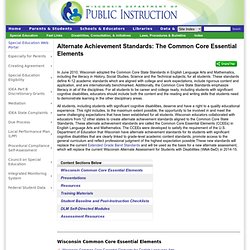
These standards define K-12 academic standards which are aligned with college and work expectations, include rigorous content and application, and are internationally benchmarked. Additionally, the Common Core State Standards emphasize literacy in all of the disciplines. For all students to be career and college ready, including students with significant cognitive disabilities, educators should include both the content and the reading and writing skills that students need to demonstrate learning in the other disciplinary areas. All students, including students with significant cognitive disabilities, deserve and have a right to a quality educational experience. Wisconsin Common Core Essential Elements Jump to Top Presentations Resources Implementation Timeline Training Materials 1A.